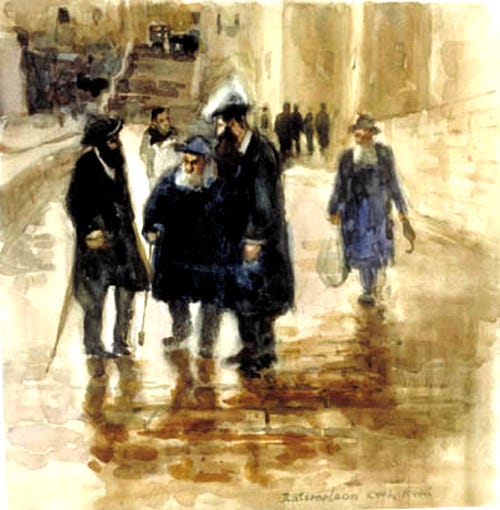You can listen to a professional narration of this article below:
Article available in Spanish here.
Why I No Longer Mind Losing an Argument
February 2016
The first time I read Dale Carnegie’s How to Win Friends and Influence People was in 1990. I was living in Russia; the Cold War had just ended. Capitalist American books suddenly became very popular. Carnegie’s was one of the first to be translated into Russian and was “the book to read.” Everyone wanted to be a capitalist, and this book was supposed to make me a better one. I decided, however, that it was stuffed with disingenuous fluff — that it taught the reader how to not be authentic; it turned you into a fake.
Thinking back, at the time I read it, that book had no chance of getting through to me. I was a product of the Soviet system. We were Seinfeld’s Soup Nazi “No soup for you” nation. Teachers who were kind and inspired students were considered weak. I remember two teachers in my school who were considered virtuosos. Neither one smiled. They rarely praised and were never afraid to insult their students for getting an answer wrong. But they were highly regarded because they knew their subjects well and thoroughly subjugated their students.
Here is how Carnegie puts it: “When dealing with people, let us remember we are not dealing with creatures of logic. We are dealing with creatures of emotion, creatures bristling with prejudices and motivated by pride and vanity.”
If we were computers and had no emotions, then my Soviet teachers would have been right that knowledge is the only thing that matters. Then teaching (communicating) would be just data transfer from teacher to student. But if you have something you think is worth uploading to others, they have to be willing to download it. This is where the wisdom of Carnegie comes in. If we were computers, the way data was packaged would be irrelevant — the content would be all that mattered. However, because we are human, the way we package our content is paramount if the other side is to be willing to receive it.
Criticism is futile because it puts a person on the defensive and usually makes him strive to justify himself. Criticism is dangerous because it wounds a person’s precious pride, hurts his sense of importance and arouses resentment.
There is a person I work with (she is probably reading this, so I have to tread lightly). She has a task she does for me on a regular basis. She is a very diligent and hardworking person, but occasionally she makes a mistake. Pre–Dale Carnegie, I would criticize her. Not anymore. Now I start with praise — how she does a great job, how sometimes I wish I could match her attention to detail — and only then do I lightly mention her mistake. Everything I say about her work is absolutely true — she’d detect a lie. The data upload is the same — she made a mistake — but I package it differently. The result is that she has been making a lot fewer mistakes and the quality of our working environment has improved.
As an investor, I am constantly involved in arguing and debating with others. I debate ideas with my partner, Mike, and with my value investor friends. Mike and I often disagree — which is awesome, because if we always agreed, one of us would be extraneous. But this quote from Carnegie’s book changed how I debate: “You can’t win an argument. You can’t because if you lose it, you lose it; and if you win it, you lose it. Why? Well, suppose you triumph over the other man and shoot his argument full of holes and prove that he is non compos mentis. Then what? You will feel fine. But what about him? You have made him feel inferior. You have hurt his pride. He will resent your triumph.”
Carnegie provides this advice: “Our first natural reaction in a disagreeable situation is to be defensive. Be careful. Keep calm and watch out for your first reaction. It may be you at your worst, not your best. Control your temper. Remember, you can measure the size of a person by what makes him or her angry. Listen first. Give your opponents a chance to talk... Look for areas of agreement. When you have heard your opponents out, dwell first on the points and areas on which you agree.”
I used to feel I had to win every argument. I patted myself on the back when I did. Now I wish I hadn’t.
Twenty-five years later I wish I could turn to my 17-year-old self and say, “Read this book slowly; pay attention; this is the most important thing you’ll ever read. It will change your life if you let it.” Unfortunately, due to the lack of a time machine, I can’t do that, but I can encourage everyone around me, including my kids, to read this very important book.
Carnegie’s book will turn anyone into a better businessperson or capitalist because it will help you to understand other people better. But more important, this book will make you a better spouse and a better parent.
P.S. I wish I’d reread Dale Carnegie’s book before my oldest child was born. I would have made fewer mistakes as a parent. I’ve been very good at trying not to criticize him and emphasizing his achievements. But I have not been careful enough in selecting his teachers. When Jonah was younger he liked to play chess, and we played together at least once a day. We got him a bona fide Russian chess teacher. He was a 70-something-year-old engineer, a brilliant chess player, Moscow champion. But he was tough. Rarely smiled. Emphasized the negatives (when Jonah made a wrong move) and underemphasized the positives (when Jonah made the right move).
He was actually a genuinely good person, and he probably would be a good teacher for an adult – like me. But Jonah required a teacher that inspired, that poured water on the small seed of interest he had in chess. Instead, after a year, Jonah lost interest and quit playing chess.
Here is another example. My daughter Hannah had a Russian language teacher (the wife of Jonah’s chess teacher). The wife was not much different from the husband – emotionless and tough. Hannah studied Russian for a year and made little progress. She was scared, intimidated. Dissatisfied with her lack of progress, we changed teachers. Hannah’s new teacher is a beam of light and excitement. When she comes to our house she brings joy (and candy). After every lesson Hannah gets candy. Hannah’s Russian leaped forward. She got to the point where she started to read and memorize poems in Russian. She participated in her first “Russian poetry jam.” She looks forward to every lesson, not just because of the candy but because her new Russian teacher figured out a way to make Hannah feel good about herself when studies Russian – that is Dale Carnegie 101.
Here are some of my latest videos on Youtube:

La Traviata – Joan Southerland
In today’s musical note I want to share with you a wonderful piece from La Traviata, performed by Luciano Pavarotti and Joan Sutherland.
Pavarotti needs no introduction, but Joan Sutherland, who passed away in 2010, is maybe less known to the younger generation. (I had her recordings but knew little about her until a few years ago.) Standing six feet two inches tall, the dynamic Australian soprano had, as Pavarotti himself put it, the “voice of the century.” Music lovers should be thankful to her for discovering the other “voice of the century” – Luciano Pavarotti. Without Sutherland’s help, Pavarotti might never gotten the lucky break that even people with incredible talent need from time to time.
Vitaliy Katsenelson is the CEO at IMA, a value investing firm in Denver. He has written two books on investing, which were published by John Wiley & Sons and have been translated into eight languages. Soul in the Game: The Art of a Meaningful Life (Harriman House, 2022) is his first non-investing book. You can get unpublished bonus chapters by forwarding your purchase receipt to bonus@soulinthegame.net.
Please read the following important disclosure here.



That quote about losing the argument either way is a Stoic type wisdom that is so needed today. I think people vilify their fellow citizens (especially in politics) in order to feel no guilt about winning an argument at all costs (nasty language and name calling included).
Here is Marcus Aurelius on criticizing others:
"From Alexander the grammarian, [I learned] to refrain from fault-finding, and not in a reproachful way to chide those who uttered any barbarous or solecistic or strange-sounding expression; but dexterously to introduce the very expression which ought to have been used, and in the way of answer or giving confirmation..."
Good thoughts about Carnegie and how we could have done better as parents if we had been more aware of his principles.
Joan Sutherland - her wikipedia biography says she was 6'1", but this is not supported by the numerous photos during her long and illustrious career, which suggest she was about 5'8 3/4 (unless you count the very abundant hair) - "She refused to be even 5 foot 9" - https://www.youtube.com/watch?v=qdOBYaMbwsI. And here she is with Kiri Te Kanawa (https://www.talkclassical.com/threads/how-tall-was-sutherland-61-or-what-i-have-proof.83817/ ), who was apparently 5'6'' and their height doesn't seem very different.
The same debate seems common for opera singers - Wikipedia says Pavarotti was 6'2", but this also seems to be an exaggeration, most sites say 5′ 10¾. They certainly seem to be about the same height in the lovely clip you included of them singing Parigi O Cara together.
You see me belatedly trying to apply Carnegie's ideas?!